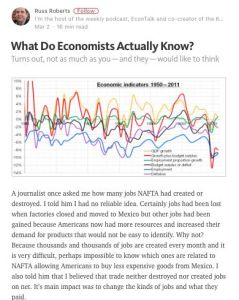Join getAbstract to access the summary!

Join getAbstract to access the summary!
Russ Roberts
What Do Economists Actually Know?
Turns out, not as much as you – and they – would like to think
NewCo Shift, 2017
What's inside?
An economist explains why you should take economists’ predictions and assessments with a grain of salt.
Recommendation
Politicians and journalists frequently call upon economists to make sense of a complex and highly unpredictable world. But the fine print that should qualify any economist’s answer is that no one actually knows for sure. In this article, EconTalk podcast host Russ Roberts provides plenty of reasons to doubt the predictive capacity of economists. Certainly, the assertion that economics isn’t a precise scientific discipline is not new. Many scholars, most notably Nassim Taleb, have argued the case elegantly. But this article is a useful reminder to approach economic predictions with a grain of salt. getAbstract recommends it to decision makers who rely on economic forecasts and to overconfident economists.
Summary
About the Author
Russ Roberts is a research fellow at Stanford University's Hoover Institution. He is the host of the EconTalk podcast and author of How Adam Smith Can Change Your Life.



















Comment on this summary